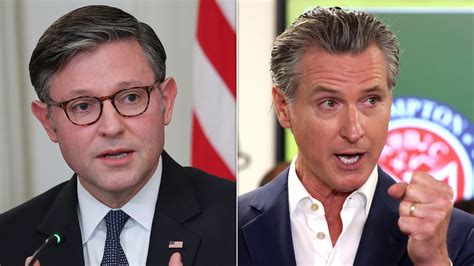
Speaker of the House Mike Johnson ignited controversy by stating California Governor Gavin Newsom should be “tarred and feathered” for his policies, specifically criticizing Newsom’s handling of California’s budget and his stance on national issues.
House Speaker Mike Johnson has sharply criticized California Governor Gavin Newsom, stating Newsom should be “tarred and feathered” due to his policies. Johnson made these remarks during a recent appearance, citing concerns over California’s budget management, Newsom’s progressive policies, and his frequent criticism of Republican leadership. The inflammatory comment underscores the widening political divide between Republican and Democratic leaders, particularly regarding state governance and national policy directions.
Johnson’s Criticism
Johnson’s harsh assessment of Newsom stems from what he views as mismanagement of California’s finances and the governor’s vocal opposition to Republican policies. “The policies that he has advocated have been absolutely devastating to the state,” Johnson stated, referencing California’s persistent budget deficits and high cost of living. He argued that Newsom’s progressive agenda, which includes policies on climate change, healthcare, and social welfare, has negatively impacted the state’s economy and quality of life.
Johnson’s comments come at a time when California faces significant economic challenges. The state’s budget has been under strain, exacerbated by factors such as declining tax revenues and increased spending on social programs. Republicans have consistently criticized Newsom for what they perceive as fiscal irresponsibility, arguing that his policies have driven businesses and residents out of the state.
Newsom’s Response
Governor Newsom’s office has yet to issue a direct response to Johnson’s specific remarks. However, Newsom has historically defended his policies, emphasizing their positive impact on the state’s environment, healthcare access, and social equity. He has often framed California as a model for progressive governance, contrasting its policies with those of Republican-led states.
Newsom has been a vocal critic of Republican policies, particularly those advanced by the Trump administration and its allies. He has frequently used his platform to advocate for Democratic priorities and to challenge what he sees as regressive policies at the national level. This has made him a prominent figure in the Democratic Party and a potential future presidential candidate.
Broader Political Context
Johnson’s remarks reflect a broader trend of increasingly polarized political discourse in the United States. The divide between Republicans and Democrats has widened on a range of issues, from economic policy to social issues, leading to heightened tensions and more confrontational rhetoric. The use of such strong language as “tarred and feathered” – a reference to a form of public punishment historically used against political opponents – underscores the depth of this divide.
The political climate has become increasingly charged, with both sides accusing the other of extreme positions and destructive policies. This has made it more difficult to find common ground and to address the country’s challenges in a bipartisan manner. The rhetoric from political leaders can further exacerbate these divisions, contributing to a sense of animosity and distrust.
California’s Economic Challenges
California, despite being a major economic powerhouse, faces a number of significant challenges. The state’s high cost of living, driven by expensive housing and stringent regulations, has made it difficult for many residents to afford to live there. This has led to an outflow of people and businesses to other states with lower costs and more favorable business climates.
The state’s budget has also been under pressure due to fluctuating tax revenues and increased spending on social programs. California relies heavily on income taxes, particularly from high-income earners, which makes its budget vulnerable to economic downturns. When the economy slows down, tax revenues can decline sharply, leading to budget deficits and the need for spending cuts or tax increases.
Newsom’s Policies
Newsom has championed a number of progressive policies during his time as governor. These include efforts to combat climate change, expand access to healthcare, and address social inequality. He has set ambitious goals for reducing greenhouse gas emissions, promoting renewable energy, and transitioning to a green economy.
His administration has also worked to expand access to healthcare through programs like Medi-Cal, the state’s Medicaid program. Newsom has supported efforts to lower healthcare costs and to ensure that all Californians have access to affordable, quality healthcare. Additionally, he has implemented policies aimed at addressing social inequality, such as raising the minimum wage and investing in affordable housing.
Republican Criticism
Republicans have consistently criticized Newsom’s policies, arguing that they are economically unsustainable and that they have negative consequences for the state’s economy. They argue that his policies have driven businesses and residents out of the state, leading to a loss of jobs and tax revenue. They also criticize his handling of the state’s budget, accusing him of fiscal irresponsibility.
Republicans have proposed alternative policies that they believe would be more effective in addressing the state’s challenges. These include measures to reduce taxes, ease regulations, and promote economic growth. They argue that these policies would create jobs, attract businesses, and improve the state’s economy.
Potential Impact
Johnson’s remarks could have several potential impacts. They could further inflame political tensions between Republicans and Democrats, making it more difficult to find common ground on important issues. They could also energize Newsom’s supporters and prompt them to rally behind him.
The remarks could also have an impact on the upcoming elections. They could motivate voters on both sides of the political spectrum to turn out and vote, potentially influencing the outcome of key races. The controversy surrounding Johnson’s remarks could also shape the narrative of the elections, focusing attention on the divide between Republicans and Democrats.
Historical Context of “Tarred and Feathered”
The phrase “tarred and feathered” has a loaded historical context, referencing a brutal form of public punishment often inflicted upon political opponents or those deemed to have violated social norms. The practice, which involves coating someone in hot tar and then covering them with feathers, was intended to humiliate and inflict pain. Its use dates back to medieval Europe and was notably employed during the American Revolution against British tax collectors and loyalists.
The invocation of such a historically violent act by a high-ranking political figure is particularly jarring in today’s political climate. It raises questions about the level of acceptable discourse and the potential for such rhetoric to incite violence or aggression. The historical weight of the phrase adds a layer of seriousness to Johnson’s criticism, transforming it from mere political disagreement into a potentially dangerous escalation of rhetoric.
The Role of Rhetoric in Politics
Political rhetoric plays a crucial role in shaping public opinion and influencing policy debates. The language used by political leaders can frame issues in certain ways, mobilize supporters, and persuade undecided voters. However, rhetoric can also be divisive, inflammatory, and misleading.
The use of strong language, such as Johnson’s reference to “tarring and feathering,” can be particularly impactful. It can grab attention, evoke strong emotions, and rally support. However, it can also alienate opponents, escalate tensions, and contribute to a climate of animosity.
Political leaders have a responsibility to use rhetoric responsibly and to avoid language that could incite violence or division. While it is important to engage in robust debate and to advocate for one’s beliefs, it is equally important to maintain a level of civility and respect.
California’s Unique Political Landscape
California has a unique political landscape that sets it apart from many other states. It is a reliably Democratic state, with a strong progressive movement and a history of enacting progressive policies. However, it also has a large and diverse population, with significant regional variations in political views.
The state’s political landscape has been shaped by factors such as its large Latino population, its vibrant tech industry, and its strong environmental movement. These factors have contributed to a political culture that is generally more liberal and progressive than that of the country as a whole.
California’s political landscape also reflects the growing divide between urban and rural areas. The state’s major cities, such as Los Angeles and San Francisco, are overwhelmingly Democratic, while its rural areas tend to be more conservative. This divide has contributed to political tensions and has made it more difficult to find common ground on important issues.
Future Implications
The exchange between Johnson and Newsom highlights the deep divisions in American politics and the challenges of finding common ground on important issues. It also underscores the importance of responsible rhetoric and the need for political leaders to avoid language that could incite violence or division.
The future implications of this exchange are uncertain. It could further inflame political tensions and make it more difficult to address the country’s challenges in a bipartisan manner. Alternatively, it could serve as a wake-up call, prompting political leaders to reflect on their rhetoric and to strive for a more civil and constructive dialogue.
FAQ Section
1. Why did Speaker Johnson say Governor Newsom should be “tarred and feathered”?
Speaker Johnson made the remark as a harsh criticism of Governor Newsom’s policies, particularly concerning California’s budget management and progressive agenda. He believes Newsom’s policies have negatively impacted the state’s economy and quality of life. The comment reflects a deep political divide and disapproval of Newsom’s approach to governing.
2. What are some of the specific policies of Governor Newsom that Speaker Johnson is criticizing?
Speaker Johnson likely criticizes Newsom’s policies on climate change, healthcare, and social welfare. These policies, which include ambitious goals for reducing greenhouse gas emissions, expanding access to healthcare through programs like Medi-Cal, and addressing social inequality by raising the minimum wage and investing in affordable housing, are viewed by some Republicans as economically unsustainable and detrimental to the state’s economy.
3. How has Governor Newsom responded to criticisms from Republicans like Speaker Johnson?
Governor Newsom has not directly responded to Johnson’s specific remarks, but he has historically defended his policies by emphasizing their positive impact on the state’s environment, healthcare access, and social equity. He often presents California as a model for progressive governance, contrasting its policies with those of Republican-led states and challenging what he sees as regressive policies at the national level.
4. What is the historical significance of the phrase “tarred and feathered”?
“Tarred and feathered” is a reference to a brutal form of public punishment historically used against political opponents or those deemed to have violated social norms. It involves coating someone in hot tar and then covering them with feathers, intended to humiliate and inflict pain. Its use dates back to medieval Europe and was notably employed during the American Revolution against British tax collectors and loyalists. The phrase carries a significant weight, implying violence and severe disapproval.
5. What impact could Speaker Johnson’s remarks have on the political climate and future elections?
Speaker Johnson’s remarks could further inflame political tensions between Republicans and Democrats, potentially making it more difficult to find common ground on important issues. It could also energize Newsom’s supporters and prompt them to rally behind him. Additionally, the remarks could motivate voters on both sides of the political spectrum to turn out and vote in upcoming elections, potentially influencing the outcome of key races. The controversy surrounding Johnson’s remarks could also shape the narrative of the elections, focusing attention on the divide between Republicans and Democrats.
Expanded Analysis and Contextual Details:
Deeper Dive into California’s Budget Issues:
California’s budget woes are complex, stemming from a combination of factors. The state’s heavy reliance on income taxes, particularly from high-income earners in the tech and entertainment industries, makes its revenue stream volatile. During economic booms, tax revenues surge, allowing for generous spending on social programs and infrastructure. However, during economic downturns, these revenues can plummet, leading to significant budget shortfalls.
The state’s progressive tax structure, while designed to promote income equality, exacerbates this volatility. When the stock market declines or tech companies face layoffs, California’s tax revenue takes a hit, forcing policymakers to make difficult choices about spending cuts or tax increases. This cyclical pattern has led to repeated budget crises, requiring creative solutions and often unpopular decisions.
Furthermore, California’s high cost of living, particularly in the Bay Area and Southern California, puts pressure on the state’s social safety net. The demand for affordable housing, healthcare, and other essential services is high, requiring significant investments from the state government. This further strains the budget, making it difficult to balance competing priorities.
Newsom has attempted to address these challenges through a combination of spending cuts, tax increases, and revenue diversification efforts. However, these measures have been met with resistance from both Republicans and some Democrats, who disagree on the best approach to fiscal management. The state’s budget remains a perennial source of political conflict.
Newsom’s National Ambitions and Political Positioning:
Gavin Newsom has long been viewed as a rising star in the Democratic Party, with potential presidential ambitions. His progressive policies and vocal criticism of Republican leadership have made him a popular figure among Democrats nationwide. He has used his position as governor of California, the nation’s most populous state, to advocate for Democratic priorities and to challenge Republican policies.
Newsom’s frequent clashes with Republican leaders, such as Mike Johnson, serve to elevate his national profile and to solidify his standing as a leader of the Democratic resistance. By positioning himself as a counterweight to Republican policies, he can appeal to Democratic voters who are eager for a strong voice to challenge the opposition.
However, Newsom’s national ambitions also face challenges. His progressive policies are not universally popular, even among Democrats. Some moderate and conservative Democrats may be wary of his more liberal stances on issues such as healthcare, climate change, and social welfare.
Furthermore, Newsom’s record in California is not without its critics. Republicans point to the state’s high cost of living, budget deficits, and other challenges as evidence that his policies are not working. These criticisms could be used against him in a national campaign.
Despite these challenges, Newsom remains a potential contender for the Democratic presidential nomination in future elections. His ability to attract media attention, raise campaign funds, and mobilize Democratic voters makes him a formidable political force.
The Deepening Partisan Divide:
The increasingly polarized political discourse in the United States is a major challenge facing the country. The divide between Republicans and Democrats has widened on a range of issues, making it more difficult to find common ground and to address the country’s challenges in a bipartisan manner.
This polarization is driven by a number of factors, including the rise of social media, the decline of traditional media outlets, and the increasing influence of special interest groups. Social media has created echo chambers where people are primarily exposed to information that confirms their existing beliefs. This can lead to a hardening of attitudes and a decreased willingness to engage with opposing viewpoints.
The decline of traditional media outlets has also contributed to polarization. As newspapers and television news stations have struggled to maintain their audience, they have increasingly focused on partisan content that appeals to specific groups of viewers or readers. This has further divided the country and made it more difficult to find a common set of facts.
The increasing influence of special interest groups has also played a role. These groups often donate large sums of money to political campaigns and lobby policymakers to support their interests. This can lead to policies that benefit a narrow group of people at the expense of the broader public good.
The consequences of this polarization are significant. It makes it more difficult to pass legislation, address pressing issues, and maintain a functioning democracy. It also contributes to a climate of distrust and animosity, making it more difficult for people to come together to solve problems.
The Future of California Politics:
The future of California politics is uncertain. The state faces a number of significant challenges, including its high cost of living, budget deficits, and climate change. How these challenges are addressed will have a major impact on the state’s future.
The state’s political landscape is also evolving. The growing Latino population is becoming an increasingly important political force. The tech industry is continuing to shape the state’s economy and culture. And the environmental movement is pushing for ambitious policies to address climate change.
The outcome of future elections will determine the direction of California politics. If Democrats continue to control the state government, they are likely to pursue progressive policies on issues such as healthcare, climate change, and social welfare. If Republicans gain more power, they are likely to push for policies that reduce taxes, ease regulations, and promote economic growth.
Regardless of the outcome of future elections, California will continue to be a major player in national politics. The state’s size, economic power, and diverse population make it a significant force in shaping the national debate.
Analyzing the “Tarred and Feathered” Metaphor:
The use of the phrase “tarred and feathered” by Speaker Johnson is not merely a figure of speech. It is a deliberate invocation of a historically violent and humiliating act, carrying with it a significant amount of baggage. Understanding the connotations associated with this phrase is crucial to comprehending the severity and potential impact of Johnson’s statement.
The act of tarring and feathering was not simply about inflicting physical pain. It was designed to strip the victim of their dignity, turning them into a public spectacle of ridicule and scorn. The tar, often scalding hot, caused burns and discomfort, while the feathers added to the humiliation. The victim was paraded through the streets, subjected to jeers and insults from the crowd.
The use of this metaphor in a political context is particularly troubling. It suggests that Speaker Johnson views Governor Newsom not merely as a political opponent, but as someone deserving of public shaming and punishment. This kind of rhetoric can contribute to a climate of animosity and violence, making it more difficult to engage in civil discourse and to find common ground.
It is important to note that the use of such language is not unique to one side of the political spectrum. Inflammatory rhetoric has become increasingly common in recent years, as politicians and commentators on both the left and the right have resorted to extreme language to mobilize their supporters and demonize their opponents.
However, the use of a metaphor as violent and historically charged as “tarred and feathered” is particularly egregious. It crosses a line and contributes to a climate of political toxicity that is harmful to the country as a whole.
Exploring Alternative Forms of Political Discourse:
The exchange between Johnson and Newsom highlights the need for alternative forms of political discourse that are more respectful, constructive, and focused on finding common ground. There are a number of ways to promote more civil and productive political conversations.
One approach is to focus on the issues rather than on personalities. Instead of attacking each other, politicians should engage in a substantive debate about the merits of different policies. This can help to create a more informed public and to promote a better understanding of the complex challenges facing the country.
Another approach is to listen to and respect opposing viewpoints. Even if one disagrees with someone’s position, it is important to listen to their arguments and to try to understand their perspective. This can help to build bridges and to find common ground.
It is also important to avoid using inflammatory language or personal attacks. These kinds of tactics can alienate opponents and make it more difficult to engage in constructive dialogue. Instead, politicians should strive to use language that is respectful, civil, and focused on promoting understanding.
Finally, it is important to remember that politics is not a zero-sum game. It is possible to disagree with someone on certain issues while still working together on other issues. By focusing on areas of common ground, politicians can build relationships and find solutions to the challenges facing the country.
The Role of Media in Shaping Public Perception:
The media plays a crucial role in shaping public perception of political events and figures. The way that the media frames issues, selects sources, and presents information can have a significant impact on how people understand and respond to political developments.
In the case of the exchange between Johnson and Newsom, the media has played a key role in amplifying the controversy and shaping public opinion. News outlets have highlighted Johnson’s inflammatory language and have provided context about the historical significance of the phrase “tarred and feathered.”
The media has also provided a platform for both Johnson and Newsom to explain their positions and to respond to criticism. This has allowed the public to hear directly from the two politicians and to form their own opinions about the controversy.
However, the media also has a responsibility to present information in a fair and accurate manner. It is important for news outlets to avoid sensationalizing events or taking sides in political disputes. Instead, they should strive to provide objective and unbiased coverage that allows the public to make informed decisions.
The media also has a responsibility to hold politicians accountable for their words and actions. By scrutinizing their statements and exposing any inconsistencies or misrepresentations, the media can help to ensure that politicians are held to a high standard of conduct.
In the long run, a free and responsible media is essential for a healthy democracy. It provides the public with the information they need to make informed decisions and holds politicians accountable for their actions.
Expanding on Newsom’s Policies and Their Impact:
To provide a more balanced and comprehensive understanding of the situation, it’s crucial to delve deeper into specific Newsom policies and analyze their multifaceted impacts, rather than simply presenting them as either positive or negative.
Climate Change Initiatives: California has been a leader in climate action, setting ambitious goals for reducing greenhouse gas emissions and transitioning to renewable energy sources. One key policy is the state’s cap-and-trade program, which puts a price on carbon emissions and incentivizes businesses to reduce their environmental footprint. While proponents argue this program is essential for combating climate change and fostering innovation in clean energy technologies, critics contend it increases energy costs for consumers and businesses, potentially hindering economic growth. The transition to electric vehicles (EVs), another major component of Newsom’s climate agenda, involves mandates for EV sales and investments in charging infrastructure. While these efforts aim to reduce air pollution and dependence on fossil fuels, concerns remain about the affordability of EVs for low-income residents and the strain on the state’s power grid as EV adoption increases.
Healthcare Expansion: Newsom has championed efforts to expand access to healthcare through Medi-Cal, the state’s Medicaid program, and by supporting policies aimed at lowering healthcare costs. These initiatives include expanding eligibility for Medi-Cal to undocumented immigrants and negotiating drug prices to reduce costs for consumers. Supporters argue that these policies are essential for ensuring that all Californians have access to affordable, quality healthcare. However, critics raise concerns about the cost of these programs and their potential impact on the state’s budget. There are also debates about the effectiveness of price negotiation strategies and their potential to stifle innovation in the pharmaceutical industry.
Housing Crisis and Affordability: California faces a severe housing crisis, with high housing costs and a shortage of affordable units. Newsom has implemented policies aimed at increasing housing construction and addressing the root causes of homelessness, including streamlining the permitting process for new developments and investing in affordable housing projects. However, these efforts have been met with resistance from local communities who oppose new development in their neighborhoods. There are also debates about the effectiveness of different approaches to addressing homelessness, with some advocating for increased housing supply and others emphasizing the need for comprehensive support services.
Minimum Wage Increases: California has gradually increased its minimum wage to $15 per hour, a policy aimed at reducing poverty and improving the living standards of low-wage workers. Supporters argue that this policy provides a much-needed boost to the incomes of low-wage workers and stimulates the economy. However, critics contend that it increases labor costs for businesses, potentially leading to job losses and higher prices for consumers. The impact of minimum wage increases on employment is a subject of ongoing debate among economists.
By examining the complexities and trade-offs associated with these policies, a more nuanced understanding of Newsom’s governorship can be achieved.
The speaker’s comments will continue to reverberate, further intensifying an already fractious political atmosphere.









